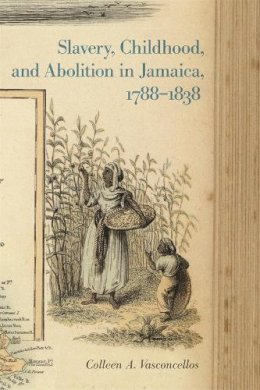
Slavery, Childhood, and Abolition in Jamaica, 1788-1838 (Early American Places): 9
Colleen A. Vasconcellos
This study examines childhood and slavery in Jamaica from the onset of improved conditions for the island’s slaves to the end of all forced or coerced labor throughout the British Caribbean. As Colleen A. Vasconcellos discusses the nature of child development in the plantation complex, she looks at how both colonial Jamaican society and the slave community conceived childhood—and how those ideas changed as the abolitionist movement gained power, the fortunes of planters rose and fell, and the nature of work on Jamaica’s estates evolved from slavery to apprenticeship to free labor. Vasconcellos explores the experiences of enslaved children through the lenses of family, resistance, race, status, culture, education, and freedom. In the half-century covered by her study, Jamaican planters alternately saw enslaved children as burdens or investments. At the same time, the childhood experience was shaped by the ethnically, linguistically, and culturally diverse slave community.
Vasconcellos adds detail and meaning to these tensions by looking, for instance, at enslaved children of color, legally termed mulattos, who had unique ties to both slave and planter families. In addition, she shows how traditions, beliefs, and practices within the slave community undermined planters’ efforts to ensure a compliant workforce by instilling Christian values in enslaved children. These are just a few of the ways that Vasconcellos reveals an overlooked childhood—one that was often defined by Jamaican planters but always contested and redefined by the slaves themselves.
Product Details
About Colleen A. Vasconcellos
Reviews for Slavery, Childhood, and Abolition in Jamaica, 1788-1838 (Early American Places): 9
James Robertson, department of history and archaeology, The University of West Indies, Mona Slavery, Childhood, and Abolition in Jamaica adds considerably to our understanding of how amelioration altered the actions of slave owners in fundamental ways. Vasconcellos has a number of fresh ideas on the significance of childhood as a political and, to an extent, a social issue in the transition from slavery to freedom in eighteenth- and nineteenth-century Jamaica.
Trevor Burnard
author of Creole Gentlemen: The Maryland Elite, 1691-1776
Well researched and elegantly written, Colleen Vasconcellos’s Slavery, Childhood and Abolition in Jamaica broadens Atlantic discussions of childhood by providing insights into the political, socioeconomic, and cultural factors that shaped enslaved children in the British Caribbean.
Shani Roper
Journal of the History of Childhood and Youth
